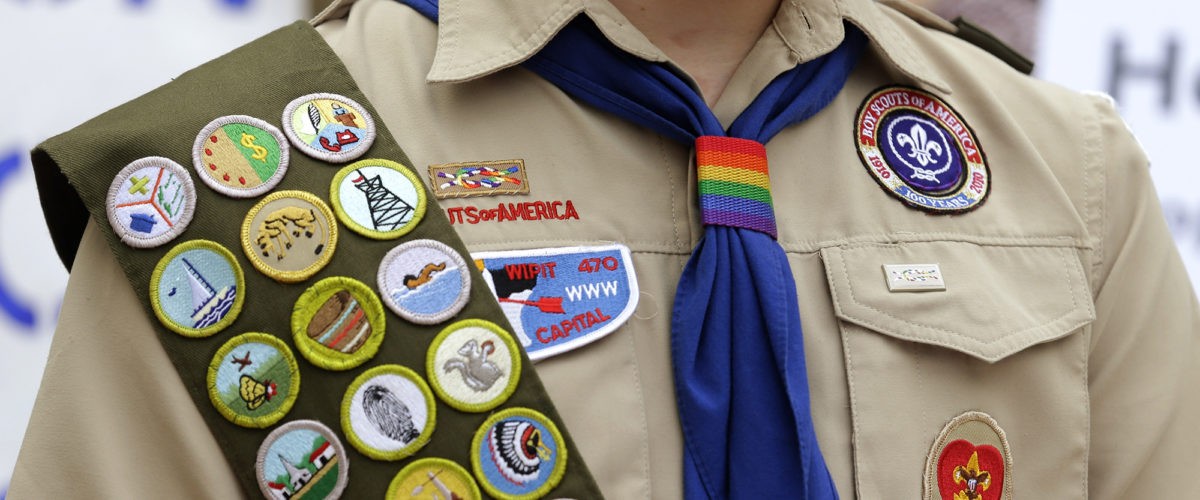Should churches that charter Boy Scouts of America packs or troops continue their affiliation with the organization in light of its current bankruptcy proceedings? The answer for United Methodist congregations is “no,” according to an announcement from UMC officials.
This call to disaffiliation matters because United Methodist churches are the largest remaining source of BSA organizational charters, now that the Church of Jesus Christ of Latter-Day Saints broke formal ties with the BSA last year, removing a reported 400,000 youth from BSA programs chartered by Mormon congregations in order to create its own global youth development program.
In Boy Scout structures, “chartered organizations” are churches, schools, clubs or individuals that agree to work with a local BSA council to be responsible for a Boy Scout troop or Cub Scout pack, often providing meeting space and identity. As recently as a decade ago, at least two-thirds of BSA chartered organizations were churches, with the Mormons representing 37% of all units and UMC churches accounting for another 10%.
As recently as a decade ago, at least two-thirds of BSA chartered organizations were churches.
Baptist congregations, and especially Southern Baptist congregations, have a lesser history of sponsoring BSA packs and troops, in part because of the SBC’s own age-graded programs, including Royal Ambassadors and Girls in Action.
Current litigation concerns
At issue currently is the potential liability those chartered organizations could face as the BSA works through bankruptcy court due to tens of thousands of claims of child sexual abuse that reach back decades. On Aug. 19, a federal judge overseeing the bankruptcy case approved the BSA’s proposed $850 million settlement, but the deal still faces opposition, including from church groups and other sponsoring organizations.
Because of its deep connection with scouting that goes back more than a century, the UMC appointed an ad hoc committee to represent the denomination’s interests in the litigation. That group currently advises UMC churches not to continue their chartered organization status with the BSA, even if they continue to support scouting generally.
“The denomination continues to maintain a relationship with the BSA, and churches may continue to support scout troops,” the committee said in a statement to churches. “However, the ad hoc committee is disappointed and very concerned that the BSA did not include its sponsoring organizations, charter groups, in the agreement with the claimants. This leaves as many as 5,000 United Methodist U.S. congregations — or more than 15% of U.S. congregations — exposed to potential lawsuits by the survivor claimants. Charter organizations were promised by the BSA to be covered by their insurance, but at this time, it is not clear to what extent United Methodist congregations will be covered.”
The ad hoc committee recommends that UMC churches let their organizational charters expire but continue with a “facilities use agreement.”
Until things get cleared up, the ad hoc committee recommends that UMC churches let their organizational charters expire but continue with a “facilities use agreement.” That lesser legal entanglement purportedly would limit congregations’ legal liability.
An insurers’ perspective
One year ago, prior to the most recent action from bankruptcy court, one national insurance company that covers many churches posted specific advice on its website about the BSA liability issue. That advice from Brotherhood Mutual insurance company remained active on the company’s site as of Sept. 1.
“While the bankruptcy proceeding may eliminate certain protections and the ability to recover from the Boy Scouts of America for past incidents of sexual abuse or injury, it is unlikely to have any effect on a church’s own liability coverage,” the company advises. “The effect of the bankruptcy will likely eliminate future claims and judgment against BSA for acts or events that took place prior to the bankruptcy. In effect, this could eliminate BSA’s obligation to indemnify a church for past incidents involving a Boy Scout troop that the church chartered or hosted.”
Some attorneys, the company notes, are advising their client churches and organizations to make their own filings with the bankruptcy court. The deadline for such claims was Nov. 16, 2020.
One important note from the Brotherhood Mutual site is for churches to beware of the status of liability insurance available to BSA chartered organizations after BSA emerges from bankruptcy.
“If your ministry has ever hosted or chartered a Boy Scouts troop and is wondering if it should take any action in relation to the BSA’s bankruptcy case, you should consult with a local attorney,” Brotherhood Mutual advises. “If your ministry is a part of a denomination, it would also be a good idea to check with your local, regional or national headquarters for guidance.”
One important note from the Brotherhood Mutual site is for churches to beware of the status of liability insurance available to BSA chartered organizations after BSA emerges from bankruptcy.
“Although BSA has historically agreed to indemnify charter organization churches and provide liability insurance on their behalf, that obligation will not likely remain after BSA’s bankruptcy is completed,” it explains. “If BSA liability insurance coverage is no longer available for charter organization churches, then the churches’ own liability insurance would likely apply. This is especially true if the charter organization church is sued directly.”


